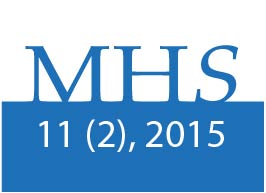Personal Strengths and Health Habits in College Students of Human Movement Sciences
DOI:
https://doi.org/10.15359/mhs.11-2.2Keywords:
student population, positive psychology, sleep, substance use,Abstract
The purpose of this study was to define and relate character strengths and health habits in a sample of college students enrolled in Human Movement Sciences careers. A total of 234 students (137 males and 97 females) provided information on character strengths and sleep and substance use habits. Group differences and variable correlations were analyzed. The results suggest that the main strengths are: gratitude, curiosity, authenticity, kindness and leadership. There are differences when comparing careers and genders. Healthy habits prevail and correlate with some strengths. Strengths in this sample show that students tend to care for others and are able to express and be sensitive to emotions. Healthy habits and their relation with character strengths appear consistent with the qualities of the school they belong to.
References
Arguello, M., Bautista, Y., Carvajal, J., De Castro, K., Díaz, D., Escobar, M. y Agudelo, D. (2009). Estilos de vida en estudiantes del área de la salud de Bucaramanga. Revista de Psicología Universidad de Antioquia, 1(2), 27-41. Recuperado de http://aprendeenlinea.udea.edu.co/revistas/index.php/psicologia/article/viewArticle/10019
Arrivillaga, M. y Salazar, I. C. (2005). Creencias relacionadas con el estilo de vida de jóvenes latinoamericanos. Psicología Conductual, 13(1), 19-36. Recuperado de http://www.funveca.org/revista/pedidos/product.php?id_product=217
Arrivillaga, M., Salazar, I. C. y Correa, D. (2003). Creencias sobre la salud y su relación con las prácticas de riesgo o de protección en jóvenes universitarios. Colombia Médica, 34(4), 186-195. Recuperado de https://tspace.library.utoronto.ca/handle/1807/3464
Brdar, I., & Kashdan. T. B. (2010). Character strengths and well-being in Croatia: An empirical investigation of structure and correlates. Journal of Research in Personality, 44, 151–154. https://doi.org/10.1016/j.jrp.2009.12.001
Chida, Y., & Steptoe, A. (2008). Positive psychological well-Being and mortality: A quantitative review of prospective observational studies. Psychosomatic Medicine,70, 741–756. http://dx.doi.org/10.1097/PSY.0b013e31818105ban
Cosentino, A. y Castro Solano, A. (2008). Inventario de virtudes y fortalezas. Manuscrito no publicado.
Cosentino, A. C. (2009). Evaluación de las virtudes y fortalezas humanas en población de habla hispana. Psicodebate, 10, 53-71. https://doi.org/10.18682/pd.v10i0.388
Cosentino, A. C., & Castro Solano, A. (2012). Character strengths: A study of Argentinean soldiers. The Spanish Journal of Psychology, 15(1), 199-215. https://doi.org/10.5209/rev_SJOP.2012.v15.n1.37310
Domínguez, L. y Díaz, E. (2006). La Evaluación de los trastornos del sueño. En V. E. Caballo (Ed.), Manual para la evaluación clínica de los trastornos psicológicos. Trastornos de la edad adulta e informes psicológicos (pp.281-297). Madrid: Pirámide.
Emmons, R. A., & McCullough, M. E. (2003). Counting blessings versus burdens: An experimental investigation of gratitude and subjective well-Being in daily life. Journal of Personality and Social Psychology, 84, 377–389. https://doi.org/10.1037/0022-3514.84.2.377
Emmons, R A., & Shelton , C. M. (2002) Gratitude and the science of positive psychology. En: C.R. Snyder & S.J. Lopez (eds.), Handbook of Positive Psychology (pp. 459-471). New York: Oxford University Press.
Epstein, J. A., Griffin, K. W., & Botvin, G. J. (2002). Positive impact of competence skills and psychological wellness in protecting inner-city adolescents from alcohol use. Prevention Science, 3(2), 95-104. https://doi.org/10.1023/A:1015479216401
Gaultney, J. (2010). The prevalence of sleep disorders in college students: Impact on academic performance. Journal of American College Health, 59(2), 91-97. https://doi.org/10.1080/07448481.2010.483708
Gillham, J., Adams-Deutsch, Z., Werner, J., Reivich, K., Coulter-Heindl, V., Linkins, M.,… &Seligman, M. E. P. (2011). Character strengths predict subjective well-being during adolescence. The Journal of Positive Psychology, 6(1), 31-44. https://doi.org/10.1080/17439760.2010.536773
Giménez Hernández, M. (2010). La medida de las fortalezas psicológicas en adolescentes (VIA-Youth): Relación con clima familiar, psicopatología y bienestar psicológico. (Tesis sin publicar de Doctorado en Psicología). Universidad Complutense de Madrid, Madrid. Recuperado de http://eprints.ucm.es/11578/1/T32253.pdf
Grimaldo, M. P. (2012). Estilo de vida saludable en estudiantes de posgrado de Ciencias de la Salud. Psicología y Salud, 22(1), 75-87. Recuperado de http://revistas.uv.mx/index.php/psicysalud/article/view/559/958
Guerra de Andrade, A., Vieira Duarte, P., Pereira Barroso, L., Nishimura, R., Alberghini, D.G., & Garcia de Oliveira, L. (2012). Use of alcohol and other drugs among Brazilian college students: Effects of gender and age. Revista Brasileira de Psiquiatria, 34, 294-305. https://doi.org/10.1016/j.rbp.2012.02.002
Jiménez-Muro, A., Beamonte, A., Marqueta, A., Gargallo, P. y Nerín de la Puerta, I. (2009). Consumo de drogas en estudiantes universitarios de primer curso. Adicciones, 21(1), 21-28. https://doi.org/10.20882/adicciones.248
Kashdan, T. B., & Fincham, F. D. (2004). Facilitating curiosity: A social and self-regulatory perspective for scientifically based interventions. En P. A. Linley & S. Joseph (Eds.), Positive psychology in practice (pp. 482-503). New Jersey: Wiley & Sons. https://doi.org/10.1002/9780470939338.ch30
Kiecolt-Glaser, J. K., McGuire, L., Robles, T. R., & Glaser, R. (2002). Emotions, morbidity, and mortality: New perspectives from psychoneuroimmunology. Annual Review of Psychology, 53, 83–107. https://doi.org/10.1146/annurev.psych.53.100901.135217
Lema, L. F., Salazar, I. C., Varela, M. T., Tamayo, J. A., Rubio, A. y Botero, A. (2009). Comportamiento y salud de los jóvenes universitarios: satisfacción con el estilo de vida. Pensamiento Psicológico, 5(12), 1-88. Recuperado de http://revistas.javerianacali.edu.co/javevirtualoj/index.php/pensamientopsicologico/article/view/106/316
Leontopoulou, S. & Triliva, S. (2012). Explorations of subjective wellbeing and character strengths among a Greek University student sample. International Journal of Wellbeing, 2(3), 251-270. https://doi.org/10.5502/ijw.v2.i3.6
Linley, P.A., & Harrington, S. (2006). Playing to your strengths. The Psychologist, 19, 86–89. Recuperado de http://www.thepsychologist.org.uk/archive/archive_home.cfm/volumeID_19-editionID_132-ArticleID_985-getfile_getPDF/thepsychologist/0206linl.pdf
Linley, P. A., & Joseph, S. (2004). Applied positive psychology: A new perspective for professional practice. En P. A. Linley & S. Joseph (Eds.), Positive psychology in practice (pp. 3-12). New Jersey: Wiley & Sons. https://doi.org/10.1002/9780470939338
Logan, D. E., Kilmer, J. R., & Marlatt, G. A. (2010). The virtuous drinker: Character virtues as correlates and moderators of college student drinking and consequences. Journal of American College Health, 58(4), 317-324. https://doi.org/10.1080/07448480903380326
Lounsbury, J. W., Fisher, L. A., Levy, J. J., & Welsh, D. P. (2009). An investigation of character strengths in relation to the academic success of college students. Individual Differences Research, 7(1), 52–69.
Lange, I. y Vio, F. (2006) Guía para Universidades Saludables y otras Instituciones de Educación Superior. Santiago: OPS, Universidad de Chile, Pontificia Universidad Católica de Chile. Recuperado de http://www7.uc.cl/ucsaludable/img/guiaUSal.pdf
Macaskill, A. (2012). A feasibility study of psychological strengths and well-being assessment in individuals living with recurrent depression. The Journal of Positive Psychology, 7(5). 372-386. https://doi.org/10.1080/17439760.2012.702783
Maddux, J. E. (2002). Stopping the “madness”. Positive psychology and the deconstruction of the illness ideology and the DSM. En: C. R. Snyder & S. J. Lopez (eds.), Handbook of Positive Psychology (pp. 13-25). New York: Oxford University Press.
Muñoz, M. y Cabieses, B. (2008). Universidades y promoción de la salud: ¿cómo alcanzar el punto de encuentro?. Revista Panamericana de Salud Pública, 24(2), 139-146. https://doi.org/10.1590/S1020-49892008000800009
Nakamura, J., & Csikszentmihalyi, M. (2002). The concept of flow. En: C. R. Snyder & S. J. Lopez (eds.), Handbook of Positive Psychology (pp. 89-105). New York: Oxford University Press.
Oades, L. G., Robinson, P. Green, S., & Spence, G. B. (2011). Towards a positive university. The Journal of Positive Psychology, 6(6), 432–439. https://doi.org/10.1080/17439760.2011.634828
Oblitas, L. A. (2008). Psicología de la salud: una ciencia del bienestar y la felicidad. Avances en Psicología, 16(1), 9-38. Recuperado de http://www.incosame.com.mx/uploads/13/11/docu_5296a13ae63a0.pdf
Park, N., & Peterson, C. (2008). The cultivation of character strengths. En: M. Ferrari and G. Potworowski (eds.), Teaching for wisdom. Cross-cultural perspectives on fostering wisdom (pp 59-77). Netherlands: Springer Science+Business Media BV.
Park, N., & Peterson, C. (2009). Character strengths: Research and practice. Journal of College & Character, 10(4), 1-10. https://doi.org/10.2202/1940-1639.1042
Park, N., Peterson, C., & Seligman. M. E. P. (2004). Strengths of character and well–being. Journal of Social and Clinical Psychology, 23(5), 603-619. https://doi.org/10.1521/jscp.23.5.603.50748
Park, N., Peterson, C., & Seligman. M. E. P. (2006). Character strengths in fifty-four nations and the fifty US states. The Journal of Positive Psychology, 1(3), 118–129. https://doi.org/10.1080/17439760600619567
Pedrals, N., Rigotti, A. y Bitrán, B. (2011). Aplicando psicología positiva en educación médica. Revista Médica de Chile, 139, 941-949. https://doi.org/10.4067/S0034-98872011000700018
Peterson, C. (2006). A primer in positive psychology. New York: Oxford University Press.
Peterson, C., & Park, N. (2004). Classification and measurement of character strengths: Implications for practice. En P. A. Linley & S. Joseph (Eds.), Positive psychology in practice (pp. 433- 446). New Jersey: Wiley & Sons. https://doi.org/10.1002/9780470939338.ch27
Peterson, C., Ruch, W., Beermann, U., Park, N., & Seligman, M. E. P. (2007). Strengths of character, orientations to happiness and life satisfaction. The Journal of Positive Psychology, 2(3), 149-156. https://doi.org/10.1080/17439760701228938
Peterson, C. & Seligman, M. E. P. (2003). The Values in Action (VIA) classification of strengths. Washington, D. C.: American Psychological Association.
Primack, B. A., Kim, K. H., Shensa, A., Sidani, J. E., Barnett, T. E., & Switzer, G. E. (2012). Tobacco, marijuana, and alcohol use in university students: A cluster analysis. Journal of American College Health, 60(5), 374-386. https://doi.org/10.1080/07448481.2012.663840
Proctor, C., Maltby, J., & Linley, P. A. (2011). Strengths use as a predictor of well-being and health-related quality of life. Journal of Happiness Studies, 12, 153–169. https://doi.org/10.1007/s10902-009-9181-2
Roberts, M. C., Brown, K. J., Johnson, R. J., & Reinke, J. (2002). Positive psychology for children. Development, prevention and promotion. En: C. R. Snyder & S. J. Lopez (eds.), Handbook of Positive Psychology (pp. 663-675). New York: Oxford University Press.
Roth, E. (1990). Aplicaciones comunitarias de la medicina conductual. Revista Latinoamericana de Psicología, 22(1), 27-50. Recuperado de http://redalyc.uaemex.mx/pdf/805/80522103.pdf
Salazar, I. C. y Arrivillaga, M. (2004). El consumo de alcohol, tabaco y otras drogas, como parte del estilo de vida de jóvenes universitarios. Revista Colombiana de Psicología, 13, 74-89. Recuperado de http://dialnet.unirioja.es/servlet/articulo?codigo=3246386
Sanabria, P. A., González, L. A. y Urrego, D. Z. (2007). Estilos de vida saludable en profesionales de la salud colombianos. Estudio exploratorio. Revista Médica,15(2), 207-217. Recuperado de http://www.scielo.org.co/scielo.php?script=sci_arttext&pid=S0121-52562007000200008
Seligman, M. (2008). Positive health. Applied Psychology: An International Review, 57, 3-18. https://doi.org/10.1111/j.1464-0597.2008.00351.x
Seligman, M., & Csikszentmihalyi, M. (2000). Positive psychology. An introduction. American Psychologist, 55(1), 5-14. https://doi.org/10.1037//0003-066X.55.1.5
Seligman, M. E. P., Ernst, R. M., Gillham, J., Reivich, K., & Linkins, M. (2009). Positive education: Positive psychology and classroom interventions. Oxford Review of Education, 35(3), 293–311.https://doi.org/10.1080/03054980902934563
Sheldon, K. M., & King, L. (2001). Why positive psychology is necessary. American Psychologist, 56, 216-217. https://doi.org/10.1037//0003-066X.56.3.216
Shimai, S., Otake, K., Park, N., Peterson, C., & Seligman, M. E. P. (2006). Convergence of character strengths in American and Japanese young adults. Journal of Happiness Studies, 7, 311-322. https://doi.org/10.1007/s10902-005-3647-7
Shoshani, A., & Slone, M. (2013). Middle school transition from the strengths perspective: Young adolescents’ character strengths, subjective well-being, and school adjustment. Journal of Happiness Studies,14(4), 1163-1181. https://doi.org/10.1007/s10902-012-9374-y
Sing, C. Y., & Wong, W. S. (2010). Prevalence of insomnia and its psychosocial correlates among college students in Hong Kong. Journal of American College Health, 59(3), 174-182. https://doi.org/10.1080/07448481.2010.497829
Steptoe, A., Dockray, S., & Wardle, J. (2009). Positive affect and psychobiological processes relevant to health. Journal of Personality, 77(6), 1747–1776. https://doi.org/10.1111/j.1467-6494.2009.00599.x
Vázquez, C., Hervás, G., Rahona, J. J. y Gómez, D. (2009). Bienestar psicológico y salud: aportaciones desde la Psicología Positiva. Anuario de Psicología Clínica y de la Salud, 5, 15-28. Recuperado de http://institucional.us.es/apcs/doc/APCS_5_esp_15-28.pdf
Veenhoven, R. (2008). Healthy happiness: Effects of happiness on physical health and the consequences for preventive health care. Journal of Happiness Studies, 9, 449–469. https://doi.org/10.1007/s10902-006-9042-1
Wood, A. M., Froh, J. J., & Geraghty, A.W. A. (2010). Gratitude and well-being: A review and theoretical integration. Clinical Psychology Review, 30, 890–905. https://doi.org/10.1016/j.cpr.2010.03.005
Wood, A. M., Joseph, S., & Linley, P. A. (2007). Coping style as a psychological resource of grateful people. Journal of Social and Clinical Psychology, 26(9), 1076–1093. https://doi.org/10.1521/jscp.2007.26.9.1076
Downloads
How to Cite
Issue
Section
License
General conditions
MHSalud: Journal in Human Movement Sciences and Health by the Universidad Nacional is cover under a Creative Commons Atribución-NoComercial-SinDerivadas 3.0 Costa Rica license.
The journal is hosted in open access repositories such as the Institutional Repository of the Universidad Nacional, the Kimuk Repository of Costa Rica and La Referencia.
The editorial source of the journal must be recognized. Use the doi identifier for this purpose.
Self-archiving policy: The journal allows the self-archiving of the articles in their peer-reviewed version, edited and approved by the Editorial Board of the Journal to be available in Open Access through the Internet. More information in the following link: https://v2.sherpa.ac.uk/id/publication/25815



















